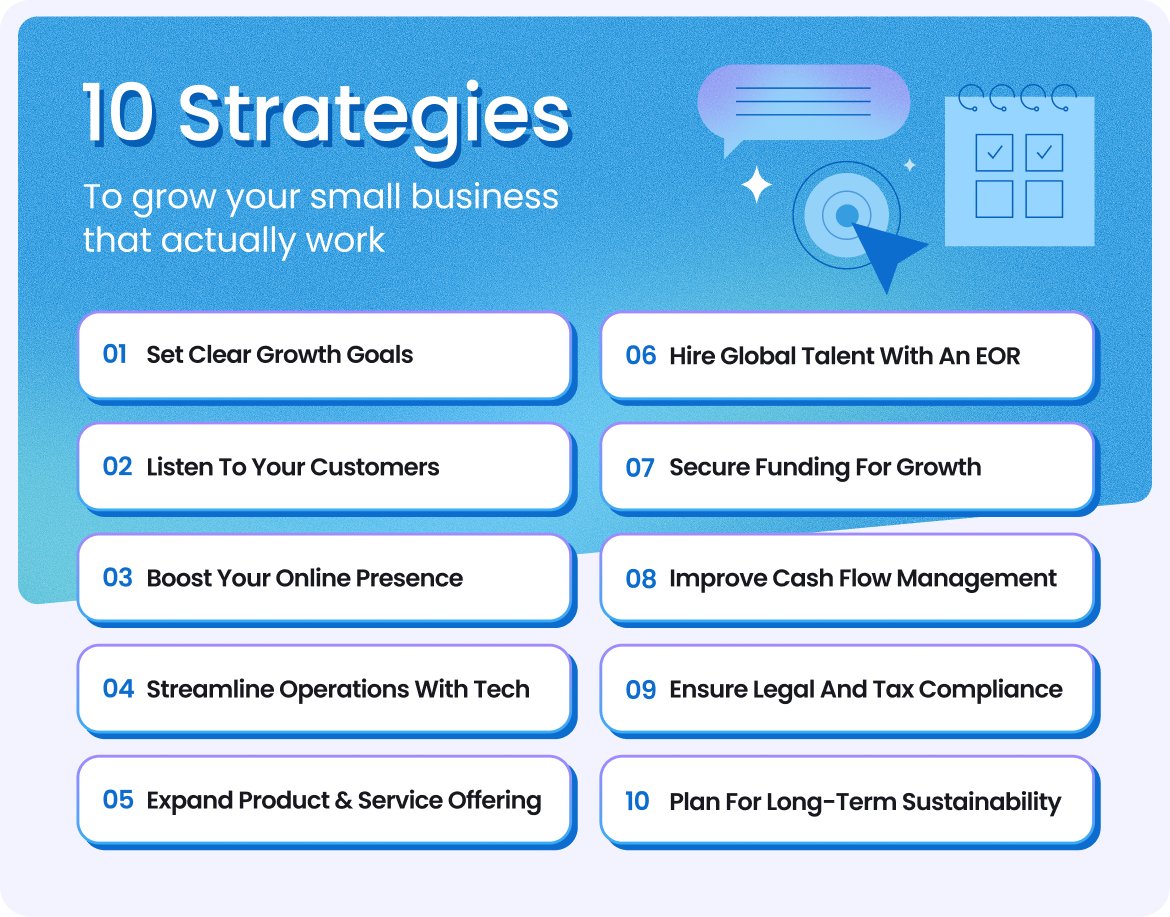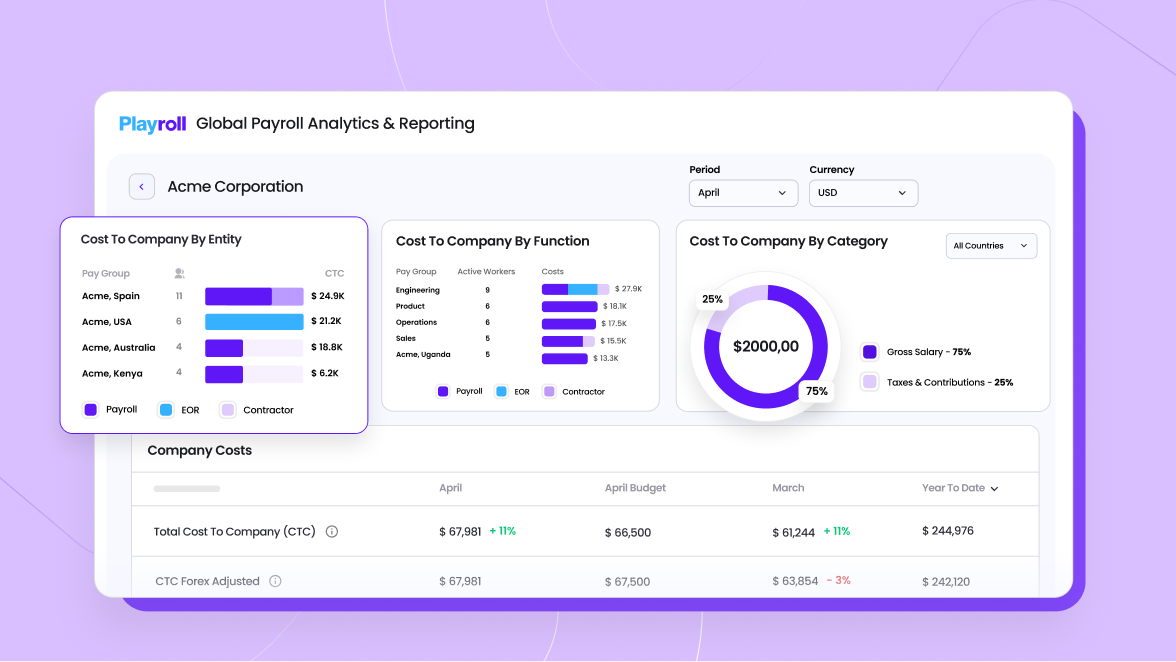Copied to Clipboard
Ready to get Started?


Key Takeaways
Success comes from setting clear, measurable goals, listening to your customers, and making consistent, strategic moves rather than relying on luck.
Streamlining operations with technology and expanding your hiring pool globally through an Employer of Record can accelerate scaling while reducing complexity.
Long-term success depends on healthy cash flow, compliance, and diversified revenue streams to weather challenges and keep growth steady.
If you're diving into starting your own company or ready to grow your small business, you're on an exciting path. You're not just chasing a paycheck, you're crafting a future and solving problems in ways that only you can. But entrepreneurship doesn’t immediately equal instant success or seven figure salaries. It’s a tough, zero-sum game where the growing pains are constant. The difference between success and failure often comes down to how well you manage that pain and use it to fuel your growth. That’s what will make your business sustainable.
The reality is that 20% of small businesses fail in their first year, 30% in their second, and 70% don’t survive past a decade. In this guide, we’ll walk you through 10 proven strategies that will help you be part of the 30% that succeed.
Plus, we’ll show you how using an Employer of Record can simplify global expansion and introduce you to software tools that’ll help you make your foundation unshakable from the get go. Let’s dive in.
Listen to the audio guide
What is Business Growth?
At its core, a good business growth strategy means expanding your reach, boosting revenue, and building a sustainable operation that can stand the test of time. It's not a race; it’s about playing the money game and making the smartest decisions to create long-term success.
Common Growth Goals
As you work on growing your small business, it’s important to set clear goals that will guide your efforts and keep you focused. Growth doesn’t just happen; it’s the result of intentional, consistent actions that will build revenue, reach new customers, and strengthen your team. Below are some of the most common growth goals that will help you scale your business sustainably.
Increasing Sales: Generating Consistent, Sustainable Revenue
Sales makes up every business, regardless of whether you’re selling a physical product, a service, or a solution. This goal focuses on maximizing revenue through strategic pricing, retaining loyal customers, and increasing the value of each transaction.
How to Achieve This:
- Streamline your sales process and increase repeat customers.
- Use upselling, cross-selling, and retention strategies.
- Optimize your pricing and test new models for better conversion.
What Does This Look Like?
A local café for example, could boost sales by offering a loyalty program that encourages customers to return regularly. Simple, but effective. Small optimizations will compound and make a bigger difference over time than large drastic changes.
Expanding into New Markets: Tapping into Fresh Potential Customers
If you’re a small business owner just starting out or are looking to scale, you’ll need a strong brand presence and a customer base in the right country, ready to buy what you’re selling. Expanding into new markets, whethier geographically or demographically, will help you create and develop both.
How to Achieve This:
- Conduct market research to understand local needs.
- Adapt your offerings to fit new customer segments.
- Partner with local influencers or businesses to speed up entry.
What Does This Look Like?
An online boutique in America might expand into Europe, offering region-specific products and collaborate with European influencers on their social media platforms to get the world out fast.
Hiring Talent: Bringing in Skilled People to Support Growth
When you’re building the foundation of something, you need the right people building beside you. Hiring talented people who align with your culture and your vision will help you scale your operations and make your goals reality.
How to Achieve This:
- Identify key roles for scaling, from marketing to operations.
- Use data-driven hiring tools to find the best fit.
- Outsource or hire freelancers for specialized tasks.
What Does This Look Like?
A tech startup looking to scale their product launch while simultaneously freeing up their time for strategic decisions, might make hiring a marketing lead and developers their top recruitment priority.
10 Easy Steps to Grow Your Small Business
Alright, let’s get down to business. These steps will guide you through actionable, no-nonsense strategies that can help grow your business from idea to enterprise.

1. Set Clear Growth Goals
You can’t grow what you don’t measure. Setting clear growth goals is the first step to scaling your business successfully. You need to understand where you're going to know how to get there. Your goals should be specific, measurable, and inspiring.
Actionable Tips
- Use the SMART Framework: Specific, Measurable, Achievable, Relevant, and Time-bound. For example, instead of saying “increase sales,” a SMART goal would be “increase sales by 20% in the next 6 months by launching a new product line.”
- Break Down Your Goals: Set short-term (monthly), medium-term (quarterly), and long-term (annually) goals to create momentum and keep track of progress.
- Review & Adjust Regularly: Business dynamics change. Review your goals monthly or quarterly to ensure they are still aligned with your current situation and adjust as necessary.
2. Listen to Your Customers
Understanding your target market is fundamental to growing your business. The better you know your customers’ pain points, desires, and buying behaviors, the more effectively you can meet their needs and build stronger relationships. Customer insights will guide product development, marketing strategies, and even customer service practices.
Actionable Tips
- Conduct Surveys & Interviews: Ask about your clients’ needs, challenges, and what they value most in a product or service like yours. If you don’t have a formal customer base, ask your friends and family first.
- Use Data Analytics: Leverage your website, social media, and sales data to identify patterns in behavior and preferences. For example, which products are most popular? Which marketing channels bring in the most customers? What are people saying about your product online?
- Monitor Competitors: Someone somewhere is succeeding or has succeeded in doing what you want to do. Find them, see what’s working, and follow the blueprint. This will give you clues about customer preferences or gaps in the market that you can fill.
3. Boost Your Online Presence
In today's digital-first world, your online presence is just as important, if not more so, than your brick and mortar storefront (if you have one). Establishing a strong, consistent online presence builds trust with your audience, attracts new customers, and helps you stay top of mind. It’ll naturally trickle down into word of mouth marketing, which is arguably your most powerful channel if you can get it right.
Actionable Tips
- Improve Your SEO: Invest time in optimizing your website for search engines. Start with keyword research and ensure your site is mobile-friendly, fast, and easy to navigate.
- Social Media Consistency: Be active on the platforms where your customers spend their time. Post regularly, engage with your audience, and build a space where your customers become community.
- Content Marketing: Start a blog, share helpful guides, or post educational videos that are genuinely valuable to your customers. Use an ai avatar generator to produce author headshots and video hosts that match your style guide without needing a full photo shoot.This’ll position you as an expert in your field and make you the go-to brand to solve a particular pain point.
4. Streamline Operations with Technology
Time is money, and efficiency is a key driver of growth. With the right technology, you can automate time-consuming tasks like payroll, inventory tracking, and customer communications, freeing up your time to focus on the actual deliverables.
Actionable Tips
- Automate Payroll & HR: Use tools like payroll software to handle employee compensation, benefits, and tax filings. This reduces administrative costs and ensures compliance.
- Use Cloud-Based Project Management Tools: Software like Trello, Asana, or Slack can help your team collaborate, track projects, and communicate effectively.
- Leverage AI: Tools like AI-powered analytics can provide insights into customer behavior, sales trends, and marketing performance, helping you make smarter, more accurate decisions faster.
5. Expand Product and Service Offerings
Don't limit your business to just one product or service. Diversifying your offerings will allow you to tap into new customer segments and unlock new streams of revenue. But don’t just create for the sake of it, keep listening to your customers and make sure that whatever your new product offering is, aligns with what your target audience actually wants.
Actionable Tips
- Ask For Feedback: Directly engage with your customers to find out what other products or services they need. Use surveys, social media polls, bring people in for a focus group, or ask targeted questions during customer service conversations.
- Test New Offerings: Don’t dive in headfirst with a massive launch. Test new ideas on a small scale to gauge interest and gather feedback before expanding.
- Upsell & Cross-Sell: Once a customer has bought something from you, keep building up their loyalty to your brand. You could, for example, offer complementary products in exchange for Google or G2 reviews which in turn will strengthen your credibility.
6. Hire International Talent with an EOR
As you expand, your talent pool shouldn’t be limited by geography. Hiring international talent allows you to bring in fresh perspectives, specialized skills, and improve overall productivity. However, hiring globally can be complex due to different labor laws, taxes, and payroll systems in every country. That's where an EOR, like Playroll, can simplify the process.
An EOR acts as a third-party employer, handling compliance, taxes, and payroll for your international hires. For small-businesses with limited resources, outsourcing the heavy lifting can save time and money on entity set-up, manage your benefits offering which you’d need a big in-house team for otherwise, and automate your payroll, all without breaking the bank.
Actionable Tips
- Look for Remote Talent: Don’t just limit yourself to local candidates. Explore platforms like Toptal, Fiverr, Gun.io, Turing, Arc.dev, and Gigster to find skilled professionals globally. Most EORs can help you source talent as well.
- Create a Seamless Onboarding Process: Ensure new hires have everything they need to succeed, no matter where they’re located, with clear communication and processes.
- Test For Compliance Support Expertise: When you’re busy building, you want a partner that is going to step in immediately when something goes wrong or you need to get something across the line yesterday. Make sure you choose an EOR that offers hands-on support when and where you need it.
7. Secure Funding for Growth
In order to make money, you have to spend money. For many businesses, especially those in the scaling phase, external funding is crucial to finance expansion, product development, or new marketing campaigns. Whether it's loans, venture capital, or crowdfunding, securing funding gives your business the fuel it needs to grow faster.
Actionable Tips
- Build a Business Case: Investors want to know how you’ll use the funds and what return they can expect. Have a clear plan, detailed projections, and proof of concept.
- Explore Funding Options: Traditional loans are one option, but consider alternatives like angel investors, venture capital, crowdfunding, private equity firms, or even government grants.
- Strengthen Your Financials: Ensure your financial records are in order and your cash flow is strong. Lenders and investors will want to see a solid financial history before committing.
8. Improve Cash Flow Management
Without healthy cash flow, your business won’t survive, let alone grow. Improving cash flow management means keeping track of income and expenses, paying attention to your invoicing cycle, and managing working capital efficiently.
Actionable Tips
- Invoice Promptly: Send invoices as soon as work is completed, and follow up regularly to ensure timely payments.
- Negotiate Payment Terms: Try to secure extended payment terms with suppliers while ensuring your customers pay upfront or on time.
- Use Accounting Software: Leverage tools like QuickBooks or Xero to track cash flow, automate invoicing, and manage expenses.
9. Ensure Legal and Tax Compliance
As your business grows, legal and tax compliance also becomes more complicated. A recent study found that more than a third of organizations are at risk of non-compliance penalties such as delayed product launches (49%), reputational damage (40%), slowed innovation (32%), and even halted trials.
Actionable Tips
- Consult With Legal and Tax Professionals: Hire experts who understand your industry and can guide you through the legal landscape, especially when expanding internationally.
- Stay Up to Date: Compliance laws are always changing, so it’s important to stay informed about any tax reforms, labor laws, or trade regulations in the markets where you’re operational.
- Use Software to Track Taxes: Use tax management software to stay on top of deadlines and filings.
10. Plan for Long-Term Sustainability
Finally, sustainability should be a major focus. Everything worthwhile takes time and effort to achieve, so focus on growing in a way that’s sustainable and limitless. This means creating systems, processes, and strategies that allow you to scale efficiently without burning out.
Actionable Tips
- Focus on Customer Loyalty: Provide ongoing value to customers, keeping them engaged with loyalty programs, newsletters, or regular follow-ups.
- Invest in Your Team: Hire for skill and culture fit, and create a supportive work environment to retain talent.
- Diversify Revenue Streams: Avoid relying on just one source of income. Explore different ways to generate revenue, such as subscriptions, online sales, or affiliate marketing, so all your eggs aren’t in one basket
Tools to Support Your Small Business Growth
Building a business from the ground up is no small feat, but it’s probably one of the most rewarding things you’ll ever do in your career. With the right tools in your corner, scaling becomes a lot more manageable.
Here are a few that can streamline your day-to-day so you can concentrate on growth:
- Payroll Software: Automate payroll with ease, saving you time, reducing errors, and ensuring your team gets paid on time.
- EOR: Expand your team globally. The right EOR partner simplifies hiring and compliance, letting you access a global talent pool without the legal complexity or steep set-up costs.
- CRM: Manage customer relationships and marketing in one place to drive sales, loyalty, and repeat business. Happy and trusting customers are key to sustained growth.
- Accounting Platforms: Stay on top of your finances with tools tailored to small business needs, keeping cash flow in check and helping you make data-driven decisions.

Start Growing Your Small Business with Playroll
Ready to level up? Expand with confidence while we take care of robust compliance, smart HCM integration, and support for your entire workforce, all without breaking the bank or a sweat. Whether you’re starting a business or growing it to new heights, we’re here to help you make it happen.
Book a demo with our experts to get started.
How to Grow Your Small Business FAQs
What are the five stages of small business growth?

.png)
The five stages of business growth are: Existence, Survival, Success, Take-off, and Resource Maturity. Each stage presents new challenges and opportunities as your business evolves.
How can I set effective growth goals for my small business?

.png)
To set effective growth goals for your small business, be sure to use the SMART framework, involve your team in goal setting, and keep track of your progress. Keep your focus on small, consistent changes that will compound over time, rather than trying to do something new and disruptive to solve every solution.
What is an Employer of Record and how does it help my business grow?

.png)
An EOR allows you to hire employees internationally without worrying about local labor laws, compliance, or payroll, making global expansion easier.
What are the biggest challenges when expanding a small business internationally?

.png)
Challenges you might face when expanding your small business internationally include understanding local regulations, managing cultural differences, and setting up logistics. However, tools like EORs and solid market research can help mitigate these hurdles.
.svg)
.svg)
.svg)

.svg)
.svg)







.png)




.svg)















.svg)